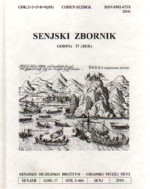Marko Antun de Dominis i njegovo izvješće Svetoj Stolici o biskupijama Senjskoj i Modruškoj
Marko Antonio de Dominis and his Report to the Holy See about the Bishoprics od Senj and Modruš
Author(s): Mile BogovićSubject(s): Christian Theology and Religion, Diplomatic history, 16th Century
Published by: Senjsko muzejsko društvo i Gradski muzej Senj
Keywords: Marco Antonio de Dominis; the Holy See; Senj and Modruš bishoprics;
Summary/Abstract: Marco Antonio de Dominis certainly belongs amongst the greats of our past whose meaning crosses Croatian borders. With his written works he deserves a lasting memorial. His theological thoughts still have freshness today, but the same it can be said that in his time he was greatly motivated by socio-political circumstances. His duty as bishop doesn't have particular significance for the diocese which he was the head of because he dealt with them without much dedication. Amongst the problems he was concerned with in regards to our region – as was also very important in Europe – was the question of Senj's Uskoks, although less with the position of these Uskoks, as with the positions of the plans of the European powers of the time. And that was ultimately allow him to stay on in the Senj-Modruš bishop's seat. However this was not to curtail his desire for a career in the church. The way to the archbishop’s seat of Split was opened him. Hence his strong and restless spirit would carry him to scenes of conflict, politics and theology. In this field, he created his world famous work: De Republica Ecclesiastica (The Ecclesiastical Republic) which impressed the world, but also put into question church practice,especially the practice of the Holy See. After some time he began his return to Rome and the papacy. We do not know what he would have said to us about that journey because of the ten anticipated books of his Retractationes he did not finish any of them completely. Firstly prison and then his grave stopped him in his work. His report to the Holy See indicated very well key points in the life of the diocese, but he did not have time – and maybe no particular will – to better address them. So we also notice a lot superficialities in the descriptions of the diocese which he managed. In Senj's bishopric there was almost nothing outside of the city's walls that was known to him. In the bishopric of Senj's archives from the time of his administration we don't have one single file. He looked at the customs of people and the circumstances in which they lived with the eyes a foreigner. He began making visits of the areas of his administration, but he didn't finish this. Not even the small places, which he included in his accounts. We can get the impression thatbetter solutions in those circumstances for these dioceses could have been achieved by his uncle Antun who was killed under Klis, although less educated than his nephew, who circled the world high science and power. One of the rare initiatives which he began was the disciplining of the Uskoks. He was not successful in that, although his proposals were wise and had perspective, but under the conditions that they would be understood and enforceable. It was something that in these circumstances could not be expected.
Journal: Senjski zbornik - prilozi za geografiju, etnologiju, gospodarstvo, povijest i kulturu
- Issue Year: 37/2010
- Issue No: 1
- Page Range: 45-58
- Page Count: 14
- Language: Croatian

